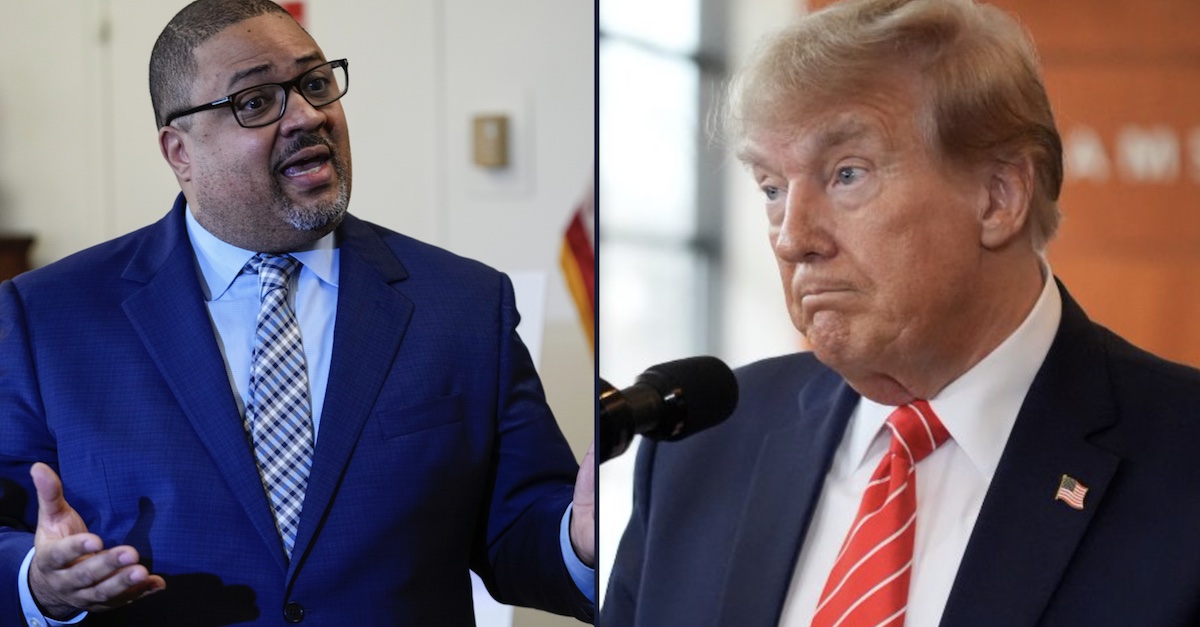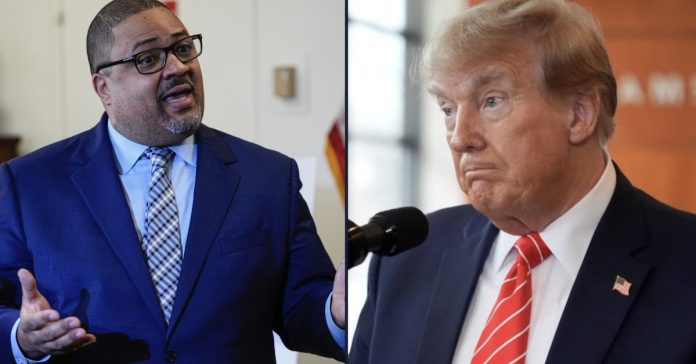
Alvin Bragg (AP Photo/Frank Franklin II), Donald Trump (AP Photo/Andrew Harnik)
Manhattan District Attorney Alvin Bragg on Monday asked a New York City judge to expand and enforce a previously issued gag order in former President Donald Trump’s upcoming hush money trial.
In an 8-page motion, the district attorney’s office once again implored New York Supreme Court Justice Juan M. Merchan to issue guidance on who, exactly, is covered by the order and to warn the defendant over a series of recent online social media posts.
“Defendant’s dangerous, violent, and reprehensible rhetoric fundamentally threatens the integrity of these proceedings and is intended to intimidate witnesses and trial participants alike — including this Court,” Bragg and his office wrote in the Monday court filing.
On March 26, Merchan issued the order. On March 27, Trump used a Truth Social media post to criticize the judge, his daughter, and Bragg. On March 28, the 45th president made similar rhetorical jabs.
On March 29, Bragg’s office filed a letter categorizing the defendant’s posts targeting the judge’s daughter as “contumacious” and asking Merchan to “clarify or confirm that the Order protects family members of the Court.” Trump defense attorney Todd Blanche quickly fired back, arguing the state was trying to “expand” the order and that “there was nothing ‘contumacious’ about the social media posts.
By late Monday, the back-and-forth dueling continued, with Bragg’s office enlarging their argument and citing additional Truth Social media posts to show the defendant’s history with such language — and to argue that he is also targeting potential witnesses.
“After a series of statements from defendant that included threatening ‘death and destruction’ if he was indicted and posting a photo of himself wielding a baseball bat at the back of the District Attorney’s head — statements which required an extensive public safety response by multiple law enforcement agencies — this Court admonished defendant to refrain from statements likely to incite violence or civil unrest or which jeopardized the rule of law,” the district attorney’s motion reads.
More Law&Crime coverage: The Trump Docket: A forgotten legal battle is about to rear its ugly head
The state originally took note of those initial posts during Trump’s April 2023 arraignment and moved for a gag order then. The issue was dispensed with, however, with a promise from the defense that their client “could and would self-regulate,” according to Bragg.
“Defendant proved himself totally incapable of self-regulating, going so far as to refer to one potential trial witness last week as ‘death,”” the district attorney’s motion goes on — with a link to yet another Truth Social media post referring to his former fixer and attorney Michael Cohen and former Manhattan prosecutor Mark Pomerantz.
The state’s effort to expand the gag order also cites no fewer than eight Truth Social media posts and argues that Trump is focusing his ire on Merchan’s daughter due, in part, to her support for the Democratic Party. While the district attorney’s office calls this a “false claim,” Merchan’s daughter is, in fact, a Democratic Party-aligned consultant.
Bragg’s filing also references the confusion over an X (formerly Twitter) account that recently used an image of Trump behind bars as its profile picture — but which changed its profile picture after being identified and attacked by Trump. The defendant alleges that account belongs to Merchan’s daughter; the New York court system claims that account no longer belongs to her; the district attorney’s office claims the entire episode was “a fraudulent impersonation.”
“Defendant’s conduct since this Court issued the March 26 Order is all the record that is necessary to justify a further order making clear that the Court’s family is off-limits,” the state’s motion goes on.
In response to a defense request for a “full adversarial briefing” on the gag order expansion and sanctions request, the district attorney’s office says no such efforts are necessary because it’s not a close call.
“This issue is not complicated,” the district attorney’s motion argues. “Family members of trial participants must be strictly off-limits. Defendant’s insistence to the contrary bespeaks a dangerous sense of entitlement to instigate fear and even physical harm to the loved ones of those he sees in the courtroom. This Court should immediately make clear that defendant is prohibited from making or directing others to make public statements about family members of the Court, the District Attorney, and all other individuals mentioned in the Order.”
While the district attorney’s office repeatedly uses language to suggest the court can simply “clarify” the order already issued, the terms of the order do not purport to limit speech about the judge himself, his family, or Bragg. Conversely, the order explicitly does limit speech toward “members of the court’s staff” and Bragg’s staff as well as the “family members of any counsel or staff member.”
Likely anticipating objections to the language employed in the order, the district attorney’s motion also calls for an outright expansion.
“Defendant’s continued harassing and disruptive conduct thus demands clarification or expansion of this Court’s March 26 Order Restricting Extrajudicial Speech to protect the Court’s ability to administer this case; to protect this Court and the Court’s family from harm; and to show all witnesses, prospective jurors, and other trial participants that the judicial system stands ready to protect them too and to preserve the rule of law in the face of defendant’s extreme and deliberate provocations,” the state’s filing reads.
Trump’s defense attorneys, once again, quickly fired back their response to the state’s arguments for increased limits on their client’s speech.
Have a tip we should know? [email protected]

